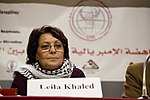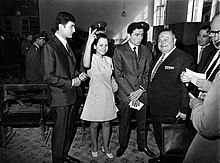Leila Khaled
Leila Khaled | |
|---|---|
 | |
| Born | 1944 |
Leila Khaled (Arabic: ليلى خالد laylà ẖālid; born April 9, 1944) is a member of the Popular Front for the Liberation of Palestine (PFLP). She is currently a member of the Palestinian National Council. She has been called the "poster girl of Palestinian militancy." [1]
Khaled came to public attention for her role in a 1969 hijacking and one of four simultaneous hijackings the following year as part of the Black September timeline.
Early life
Khaled was born in Haifa, then part of the British Mandate of Palestine. Khaled's family fled to Lebanon during the 1948 Palestinian exodus, leaving her father behind. At the age of 15, following in the footsteps of her brother, she joined the radical pan-Arab[2] Arab Nationalist Movement, originally started in the late 1940s by George Habash, then a medical student at the American University of Beirut.[3] The Palestinian branch of this movement became the Popular Front for the Liberation of Palestine after the 1967 Six-Day War.
Khaled also spent some time teaching in Kuwait, and in her autobiography recounted crying the day she heard that John F. Kennedy had been assassinated.[4]
The hijackings

On August 29, 1969, Khaled was part of a team that hijacked TWA Flight 840 on its way from Rome to Athens, diverting the Boeing 707 to Damascus. She claims she ordered the pilot to fly over Haifa, so she could see her birthplace, which she could not visit.[5] No one was injured, but the aircraft was blown up after hostages had disembarked. According to some media sources,[6] the PFLP leadership thought that Yitzhak Rabin, then Israeli ambassador to the United States, would be on board. This was, however, denied by Khaled and others.[4] After this hijacking, and after a now famous picture of her (taken by Eddie Adams) holding an AK-47 rifle and wearing a kaffiyeh was widely published, she underwent six plastic surgeries on her nose and chin to conceal her identity and allow her to take part in a future hijacking, and because she did not want to wear the face of an icon.[7][5]
On September 6, 1970, Khaled and Patrick Argüello, a Nicaraguan, attempted the hijack of El Al Flight 219 from Amsterdam to New York City as part of the Dawson's Field hijackings, a series of almost simultaneous hijackings carried out by the PFLP. The attack was foiled, when Israeli skymarshals killed Arguello before eventually overpowering Khaled. Although she was carrying two hand grenades at the time, Khaled said she had received very strict instructions not to threaten passengers on the civilian flight.[5] (Patrick Argüello, the co-hijacker, shot a member of the flight crew).
The pilot diverted the aircraft to Heathrow airport in London, where Khaled was delivered to Ealing police station. On October 1, the British government released her as part of a prisoner exchange. The next year, the PFLP abandoned the tactic of hijacking, although splinter movements would continue to hijack airplanes.[citation needed]
Later life
Khaled has said in interviews that she developed a fondness for the United Kingdom when her first visitor in jail, an immigration officer, wanted to know why she had arrived in the country without a valid visa. She also developed a relationship with the two policewomen assigned to guard her in Ealing and later corresponded with them. Khaled continued to return to Britain for speaking engagements until as late as 2002, although she was refused a visa by the British embassy in 2005 to address a meeting at the Féile an Phobail in Belfast, where she was invited as a speaker. Eventually she managed to speak to people at the Belfast Féile through a video link[8]
Khaled is wary of the Arab-Israeli peace process. According to her, "It's not a peace process. It's a political process where the balance of forces is for the Israelis and not for us. They have all the cards to play with and the Palestinians have nothing to depend on, especially when the PLO is not united."[9] She has become involved in politics, becoming a member of the Palestinian National Council[10] and appearing regularly at the World Social Forum.[11][12][13]
Witnesses say that in the late 1970s she studied history at Rostov University (USSR) but never graduated. She simply vanished in the early 1980s. There were rumours that she left for Lebanon to fight against the Israeli army invading Lebanon at that time.
She is married to the physician Fayez Rashid Hilal, and today lives with their two sons Bader and Bashar in Amman, Jordan.[14]
She was the subject of a film entitled Leila Khaled, Hijacker.[15] The documentary film "Hijacker – The Life of Leila Khaled", directed by Palestinian filmmaker, Lina Makboul, premiered in November, 2005 at the International Documentary Film Festival in Amsterdam.[16]
In popular culture
- The song Like Leila Khaled Said from The Teardrop Explodes' 1981 album Wilder is a love song to Khaled. Songwriter Julian Cope said it was a love song to her "cos I thought she was so beautiful. But I know that the whole thing was like bad news."[17]
- The 10th song named "Leila Khaled" by the Danish Rock band Magtens Korridorer in their 11-track album Friværdi released on 26 September 2005.[18]
- It is claimed that the character of savage warrior Leela from Doctor Who was named after Leila Khaled.[19]
- Mentioned by Fun-da-mental in "Mother India" widely distributed in the United States by Starbucks coffee in the"Love India" CD (2010)[20]
References
- ^ The poster girl of Palestinian militancy, Jan 30, 2007 http://www.thetimes.co.za/SpecialReports/LebanonDiary/Article.aspx?id=297355
- ^ ‘Palestinian patriot’ (Jordan Times)
- ^ Philip Baum interviews Leila Khaled on 5 September 2000
- ^ a b Khaled, Leila (1973). My People Shall Live. London: Hodder & Stoughton. ISBN 0340173807.
{{cite book}}: Cite has empty unknown parameter:|coauthors=(help) - ^ a b c "I made the ring from a bullet and the pin of a hand grenade", The Guardian, January 26, 2001 Cite error: The named reference "mqm" was defined multiple times with different content (see the help page).
- ^ MacDonald, Eileen (1991). "Leila Khaled". Shoot the Women First. New York: Random House. ISBN 0-679-41596-3.
- ^ http://www.guardian.co.uk/world/2001/jan/26/israel
- ^ A just solution is the way out of conflict - Leila Khaled
- ^ Leila Khaled: in her own words
- ^ 2005 IPSC Annual General Meeting
- ^ WSF Mumbai, India 2004
- ^ WSF Rome, Italy 2005
- ^ WSF Nairobi, Kenya 2007
- ^ Interview by Sana Abdallah, United Press International, July 21, 2003
- ^ Murphy, Maureen Clare (2007-04-09). "Violence or nonviolence? Two documentaries reviewed". Retrieved 2007-09-07.
- ^ Leila Khaled - Hijacker
- ^ Teardrop Explodes Discography | Albums
- ^ as found at Apple iTunes
- ^ A Brief History Of Time (Travel): The Face Of Evil
- ^ Global noise: rap and hip-hop outside the USA By Tony Mitchell p. 60
- Leila Khaled – hijacked by destiny, a Friday Times interview at Al-Jazeerah.info
- Interview with Aviation Security 5 September 2000 Philip Baum's edited interview with Leila Khaled
- "Leila Khaled - Hijacker" - 58 minutes Documentary by Lina Makboul
Interviews
- Free Arab Voice interviews Leila Khaled on 16 February 1999
- Philip Baum interviews Leila Khaled on 5 September 2000
- Leila Khaled interview by BBC in 2000
- Leila Khaled Interview by Sana Abdallah on 21 July 2003
- Leila Khaled interview By Mondli Hlatshwayo of Khanya College Mumbai on 19 January 2004
- Leila Khaled interview by LeiLani Dowell, Sara Flounders and Samia Halaby, in September 2006
- Matthew Cassel interviews Leila Khaled in January 2008
- Jon Elmer interviews Leila Khaled on 4 November 2009
Further reading
- "A Terrorist Returns," Theodore Dalrymple
- "I made the ring from a bullet and the pin of a hand grenade" by Katharine Viner, The Guardian, January 26, 2001
- "The guerrilla's story", BBC, January 1, 2001
- Khaled, Leila. My people shall live: the autobiography of a revolutionary. London: Hodder and Stoughton, 1973, ISBN 0-340-17380-7
- MacDonald, Eileen. Shoot the Women First. London: Arrow Books, 1992, ISBN 0-09-913871-9
- Snow, Peter, and Phillips, David. Leila's Hijack War: The True Story of 25 days in September. London: Pan Books, 1970, ISBN 0-330-02810-3
